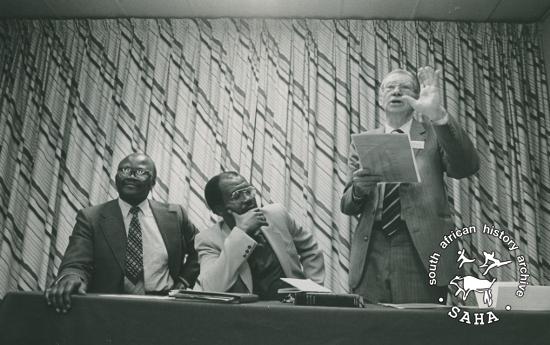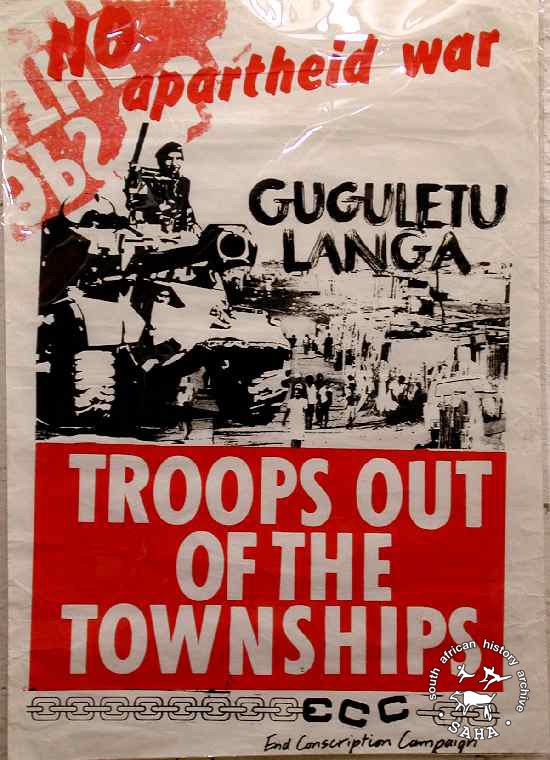April is the 19th anniversary of the first Human Rights Violation Hearing of South Africa’s TRC. It is also the month where many religious communities celebrate important days for their faith. In this context we examine the faith hearings of the TRC.
"My religion is based on truth and non-violence. Truth is my God" - Mahatma Gandhi
April is a month of many religious celebrations, dominantly marked by the celebration of the Jewish Passover weekend and the Christian Easter weekend. The different faiths communities in South Africa form a huge part of cultural diversity and also contributed to nation building during the country’s transition into democracy. Faith communities were important in facilitating the TRC process in reconciling the nation from our horrific past.
41 faith communities made their submissions to the TRC, much like the victims and perpetrators who used to TRC platform to share their stories; the South African faith communities also had their stories to tell, good and bad. The complicity and resistance to racial oppression had consequences for all South Africans and casted a dark cloud on the sacred messages of ‘peace’ and ‘love’ across faith communities.
Read more about faith communities and their interaction with the TRC by reading SAHA collection inventory AL3066: The TRC Faith Hearings Collection
Unlike the Human Rights Violation hearings or the Amnesty hearings, the faith hearings were under the “special hearings” category which focused more on institutions’ and organizations’ roles in either upholding or opposing the apartheid regime. A dominant section of the Dutch Reformed Church (DRC) was the most criticized church for condoning the ideology of white superiority through supporting the ideology that Afrikaners were God’s "chosen people”.

In their lack of actions against the oppressive system, the then moderator of the Dutch Reformed Church (DRC) Reverend Freek Swanepoel unreservedly apologized to South Africa during the TRC faith hearings for their complicity with the Apartheid regime. Reverend Swanepoel’s testimony to the TRC reflects on the strides that had to be made in order to work towards reconciliation; as a representative of the DRC, he expressed the following:
"The church also continually and with empathy focused on the large numbers of people who were unjustly disadvantaged during the times of apartheid… The Dutch Reformed Church apologises to these people and admits that its voice of protest had not been loud enough and to prove and admit that what had been done was not adequate".
AL2547_19.8.4: Beyers Naude speaking at a "Church in crisis" meeting in April 1986. View more photographs at The SAHA Original Photograph Collection AL2547 here
The DRC was not the only church within the faith communities who came forward to apologize to South Africans for their silence about human rights violations under the apartheid government. These included other Christian divisions, Muslims, Hindus and Jews faith communities. Below are parts of the transcripts retrieved from the SABC/SAHA TRC website quoting some of the apologies from difference faith communities. Chief Rabbi Harris who represented the Jewish faith community in the TRC said:
"The Jewish community benefited from apartheid, apology must be given to this commission".
The Methodist Church of Southern Africa Testimony before the Truth and Reconciliation Commission as represented by Bishop Mvume Dandala expressed the following:
"It is a quest to offer our apology to South Africa for our shortcomings, when this country was afflicted with apartheid. And to confess our co-operation with that system, both intentionally and unintentionally".
Read the full transcript of the faith communities' submissions here
On the other hand, churches like Regina Mundi Catholic Church in Soweto were the symbol of apartheid resistance for many. The Soweto based church is the largest Catholic Church in South Africa and has been recognized as a key role player in the uprising against apartheid in Gauteng.
In the spirit of reconciliation and national healing, the faith communities pledged their commitment to nation building and ensuring that they play a visible role in the elimination of human rights violations going forward (from the TRC). The importance of faith communities in South Africa is entrenched in the ethnic/racial, cultural and linguistic diversity that the country prides itself. Without their contribution the TRC would have lacked an element of significance in the South African society.
 South Africa is a religious society in which the concepts of ‘truth’, ‘peace’ and ‘forgiveness’ are associated with various religious beliefs. This is illustrated through Christopher Piet’s mother’s ability to forgive black policeman Thapelo Mbelo who was involved in the killing of apartheid activists, the Gugulethu 7, she states:
South Africa is a religious society in which the concepts of ‘truth’, ‘peace’ and ‘forgiveness’ are associated with various religious beliefs. This is illustrated through Christopher Piet’s mother’s ability to forgive black policeman Thapelo Mbelo who was involved in the killing of apartheid activists, the Gugulethu 7, she states:
The diverse faith communities in South Africa remain a symbol of nation building and redemption. The notion of forgiveness came at the price of speaking the truth, this was central to the TRC and many of the faith communities that were involved in the process.
The celebrations of religious holidays are not only an acknowledgment of spiritual nourishment but also the continuous works that South Africans embark upon to heal the tragedies of the past, spiritually and otherwise. As the country continues to work towards reconciliation and healing, may the faith communities continue to guide us into healing and grant us strength to face the truths.
AL2446_2496: End Conscription Campaign poster from the SAHA Poster Collection.
Watch Piet's mother Cynthia Ngewu make her statement about her son's death here.
To read more about the Gugulethu 7 investigation, check out SAHA Collection number AL2878.
SAHA has other archival resources relating to faith communities and the TRC. You can browse the following collection inventories by following the links:
AL3125: The Challenge of Reconciliation: A Response of Church and Lay Persons to the TRC.
The SAHA Original Photograph Collection AL2547.19.8: Resistance - Religious Leaders (See also: 16 - Personalities)






 South Africa is a religious society in which the concepts of ‘truth’, ‘peace’ and ‘forgiveness’ are associated with various religious beliefs. This is illustrated through Christopher Piet’s mother’s ability to forgive black policeman Thapelo Mbelo who was involved in the killing of apartheid activists, the Gugulethu 7, she states:
South Africa is a religious society in which the concepts of ‘truth’, ‘peace’ and ‘forgiveness’ are associated with various religious beliefs. This is illustrated through Christopher Piet’s mother’s ability to forgive black policeman Thapelo Mbelo who was involved in the killing of apartheid activists, the Gugulethu 7, she states: